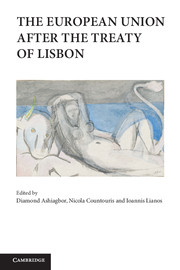Book contents
- Frontmatter
- Contents
- The European Union after the Treaty of Lisbon
- Introduction
- 1 The institutional development of the EU post-Lisbon
- 2 Competence after Lisbon
- 3 The Charter, the ECJ and national courts
- 4 Accession of the EU to the ECHR
- 5 EU citizenship after Lisbon
- 6 The law and politics of migration and asylum: The Lisbon Treaty and the EU
- 7 The European Union's common foreign and security policy after Lisbon
- 8 The European Ombudsman and good administration post-Lisbon
- 9 European contract law after Lisbon
- 10 Competition law in the European Union after the Treaty of Lisbon
- 11 The unexpected revision of the Lisbon Treaty and the establishment of a European stability mechanism
- Index
- References
3 - The Charter, the ECJ and national courts
Published online by Cambridge University Press: 05 June 2012
- Frontmatter
- Contents
- The European Union after the Treaty of Lisbon
- Introduction
- 1 The institutional development of the EU post-Lisbon
- 2 Competence after Lisbon
- 3 The Charter, the ECJ and national courts
- 4 Accession of the EU to the ECHR
- 5 EU citizenship after Lisbon
- 6 The law and politics of migration and asylum: The Lisbon Treaty and the EU
- 7 The European Union's common foreign and security policy after Lisbon
- 8 The European Ombudsman and good administration post-Lisbon
- 9 European contract law after Lisbon
- 10 Competition law in the European Union after the Treaty of Lisbon
- 11 The unexpected revision of the Lisbon Treaty and the establishment of a European stability mechanism
- Index
- References
Summary
It is axiomatic that national courts must apply EU law when construing national legislation. This has always included the primary Treaty, EU legislation made thereunder and general principles of EU law fashioned by the Community courts. The ratification of the Lisbon Treaty now poses new challenges for national courts when interpreting EU and national legislation, because it rendered the Charter of Fundamental Rights legally binding, thereby resolving an issue that had been left open since the Charter was initially drafted almost a decade earlier. The Lisbon Treaty in addition imposed an obligation on the EU to join the ECHR, thereby resolving another issue that had been on the agenda for even longer.
This chapter addresses some of the legal issues raised by this development, more especially those that are relevant to national courts in the overall scheme of the Charter. The chapter begins with a brief overview of the EU's fundamental rights’ jurisprudence and the genesis of the Charter. This is followed by analysis of the Protocol that limits the application of the Charter in the United Kingdom and Poland. The discussion then turns to the ambit of the Charter and the extent to which it applies to Member State action. The ensuing sections address the divide between rights and principles contained in the Charter and the relationship between the ECHR and the Charter. The chapter concludes with reflections on the more general impact of the Charter on judicial review and the role of the ECJ.
- Type
- Chapter
- Information
- The European Union after the Treaty of Lisbon , pp. 78 - 108Publisher: Cambridge University PressPrint publication year: 2012
References
- 1
- Cited by



